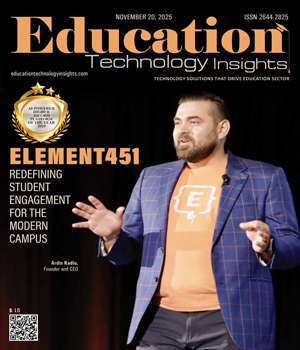THANK YOU FOR SUBSCRIBING
Be first to read the latest tech news, Industry Leader's Insights, and CIO interviews of medium and large enterprises exclusively from Education Technology Insights
Purpose-Driven Pedagogy: Shaping the Future of Higher Education
Marcio A. Oliveira, Vice Provost for Teaching and Learning Innovation, Michigan State University
Marcio A. Oliveira serves as the Vice Provost for Teaching and Learning Innovation at Michigan State University. In this role, deeply rooted in a commitment to academic innovation and educational excellence, he focuses on shaping a dynamic learning ecosystem to empower educators and students. Oliveira leads the design of scalable, enterprise-level teaching and learning solutions that support faculty development and enable integrated instructional design services across all disciplines and delivery modalities—face-to-face, hybrid, or online. His work is consciously aligned with the university’s strategic priorities and guided by human-centered values, aiming to cultivate a sustainable culture of educational excellence.
Through this article, Oliveira shares insights, drawing from MSU's context, on building elastic learning ecosystems, navigating tech trends ethically, scaling innovation sustainably, and leading human-centered change in higher education.
Driving Role: Fostering Educational Excellence Through Innovation
While still unfolding, my leadership journey at Michigan State University is deeply rooted in a commitment to academic innovation and educational excellence. I am privileged to serve in a role where I can contribute to shaping a dynamic learning ecosystem that empowers educators and students. Our focus involves designing scalable, enterprise-level teaching and learning solutions. These initiatives support faculty development and enable integrated instructional design services across all disciplines and delivery modalities—face-to-face, hybrid, or online. We consciously align these efforts with the university’s strategic priorities and embrace human-centered values, aiming to cultivate a sustainable culture of educational excellence throughout the institution.
“The most transformative institutions will approach innovation not as a siloed initiative, but as an integrated mindset”
Higher Ed Trends: Leveraging Tech Ethically & Rethinking Assessment
With shifting learner expectations, we are experiencing a significant convergence of rapidly evolving technologies, like AI, extended reality (XR), and learning analytics. This dynamic is transforming pedagogical approaches and fundamentally reshaping universities' role in preparing learners for the future workforce. Institutions like MSU must continuously explore leveraging these powerful tools ethically and equitably to personalize learning experiences, enhance interdisciplinary collaboration, and strengthen student engagement. Critically, we must also rethink how we assess learning outcomes, moving towards methods that genuinely reflect real-world competencies, creativity, and adaptability.
University Challenges: Scaling Innovation Sustainably & Actionably
One of the most pressing challenges facing universities is how to effectively scale and sustain impactful innovations without diminishing their quality or overextending institutional resources. A potential approach involves designing solutions, services, and initiatives that are both strategically agile and structurally robust, capable of expanding across diverse disciplines while remaining firmly grounded in core institutional values. Furthermore, investing intentionally in capacity building, promoting data-informed decision-making, and fostering deep cross-functional collaboration are essential to ensure that the transformation of teaching and learning becomes truly actionable, not merely aspirational.
Tech Strategy: Cultivating an Elastic Ecosystem, Not Just Stacks
Rather than concentrating solely on specific technology stacks, our strategic priority should be cultivating a future-ready and elastic learning ecosystem characterized by adaptability, resilience, and inclusivity. This requires investment not just in platforms and tools, but critically, in people, partnerships, and pedagogy. Our aim should be to create flexible learning environments that seamlessly blend digital and physical spaces, effectively support experiential and lifelong learning models, and purposefully align our innovations with the broader institutional mission. Central to this approach is co-design: collaborating closely with faculty, students, and industry partners to shape learning experiences that are relevant, rigorous, and responsive to the world's complexities beyond academia.
Adopting Innovation: Lead with Purpose, Prioritize People & Culture
My primary advice is this: lead with educational purpose, not merely with technology tools. Emerging technologies should always be integrated to meet clearly defined academic goals, not adopted for novelty alone. Institutions must be deliberate about alignment, ensuring innovations connect with strategic objectives, evidence-based pedagogical practices, and the genuine needs of their communities. I strongly emphasize building inclusive governance structures and fostering a culture of supported experimentation, where faculty and staff feel empowered to try new approaches, learn from failures, and iterate. A significant pitfall is underestimating the human dimension of change; technology can accelerate transformation, but effective pedagogy, driven by exemplary leadership, people, policies, and support systems, must be the engine. Looking ahead, the most transformative institutions will approach innovation not as a siloed initiative but as an integrated mindset, skillfully blending technology with empathy, scaling with integrity, and evolving with profound intentionality.
Read Also
Navigating Course Map Design
Beyond the Classroom: Supporting Belonging and Wellbeing for International Students
Building Responsible AI Practice Across a University
Designing Engagement That Lasts
Digital Creativity as a Catalyst for Deeper Learning
Protecting Precious Cargo: A Comprehensive Look at School Bus Safety

I agree We use cookies on this website to enhance your user experience. By clicking any link on this page you are giving your consent for us to set cookies. More info























